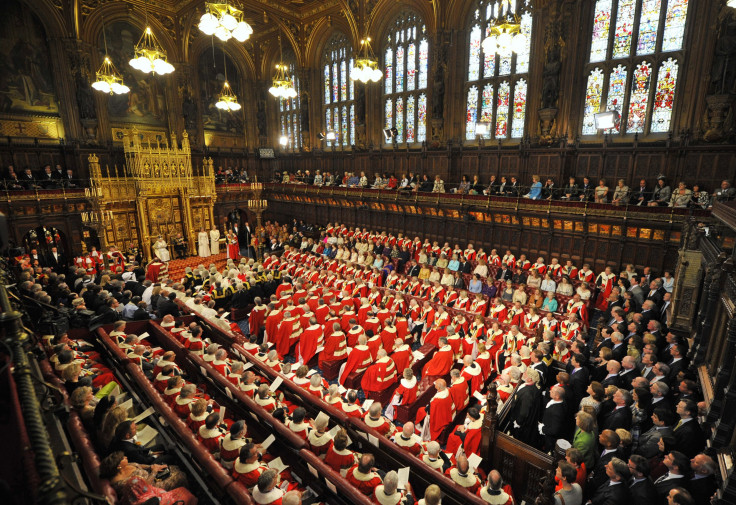Old Boys' Club: Why Are British Conservative Women MPs Quitting Parliament?

Jessica Lee, a Conservative MP for Erewash in Derbyshire, has decided to stand down at the next election, making her the fourth female Tory MP from the class of 2010 to resign. In a statement, Lee called her resignation a "difficult decision" and that she was "extremely sad" to leave, but cited "personal circumstances and responsibilities" as factors behind her move.
Lee, who narrowly won her seat by about 2,500 votes in what had been a Labour stronghold, also assured she will remain dedicated to her constituency until the next general election, which must be held by May 2015. She presently serves as a Commons aide to Dominic Grieve, the Attorney General. "It has been a huge honor serving as the Member of Parliament for Erewash and I still have much more to do over the next year and a half,” she stated. "It has been my privilege to really stand up and speak up for the constituency. …The chance to serve a community close to my roots and family background is something I will always be grateful that I have had the honor to do."
But Lee’s resignation raises questions about the Conservative Party’s treatment of women in its ranks and would frustrate Prime Minister David Cameron’s stated desire for running more females in parliamentary elections. Cameron had even declared 2014 as the “year for women,” boasting that Britain would “lead the charge on women's equality, on women's empowerment, on the empowerment of girls and women worldwide.” But apparently not in Westminster.
Lee now joins Lorraine Fullbrook (South Ribble), Laura Sandys (South Thanet) and Louise Mensch (Corby) in the mini-exodus of female Conservative MPs. According to reports in British media, only 16 percent of Conservative MPs are women, versus 31 percent for Labour (while the Liberal Democrats fare ever worse, at 12 percent). Westminster will have only 144 female MPs left, a little more than one-fifth of the total.
None of the aforementioned MPs gave explicit reasons for their sudden departures – but a report in the Telegraph newspaper suggests that women are quitting government for an array of issues related to gender. Mary Macleod, a Conservative MP for Brentford and Isleworth, said the long hours of the job posed difficulties for women with families. “We have made some changes to the way that Parliament operates, such as changing sitting hours and introducing an on-site crèche [nursery], but I feel there is more we can do,” she told the Telegraph. “One concern is about the control over working hours. Women in senior positions in business work long hours but tend to have more control over when they do so – often leaving work to put children to bed and then continuing to work from home. I would like to see us look at ways that all MPs can have more control over their working lives.”
Kate Maltby, a board member of Bright Blue, a Conservative think tank, suggests these women are quitting to take care of their elderly parents. “They have each weighed up their own responsibilities as individuals, rather than quitting for political reasons,” she said.
However, there may be more disturbing factors at play – sexual harassment by men in the male-dominated Westminster culture. "The great mystery of the vanishing women MPs isn't because the hours are terrible (they're much more family-friendly than they used to be) or because the Commons is impossible for women with small children,” said Mary Riddell of the Telegraph. "I blame the macho, antediluvian culture that lingers [there].” Riddell cited the recent case of Lord Rennard, a life peer in the House of Lords who was just suspended from the Liberal Democrats over allegations of sexual harassment.
“I think a lot of women still complain about sexual harassment in the Commons,” Maltby added. “It’s not just Lib Dems, it’s not just Rennard, it’s been going on for years. It’s still about what a woman looks like and not what a politician looks like.” Macleod concurred, opining that some of the behavior and bullying attacks witnessed in parliament would not be tolerated in the business world.
Speaking to BBC, Andrew Gimson, the editor of ConservativeHome, a political blog, also cited that, aside from long hours and the “chumocracy” (whereby all important decisions made in the chamber are conducted by men), female MPs (of all parties) are subject to vulgar and profane abuse from men on their social media accounts. Helen Grant, a Tory MP representing Maidstone and The Weald, noted that the House of Commons was an “institution designed for men hundreds of years ago – women were not thought of [then] and often it shows [now].” Grant is concerned that women are being shoved aside from the bustling world of politics. “We need to be promoting politics as an attractive career option,” she explained to the Telegraph. “Support networks and women’s groups are a key part of this and we need to use mentors and other inspirational women and men to get out there and find the best women to lead us into the future.”
However, The Mirror newspaper pointed out that this kind of “exodus” has also occurred among the Labour Party as well. In 2001, all nine female MPs from Labour stepped down after gaining seats in the 1997 landslide election.
Nonetheless, the Mirror conceded that gender equality in parliament may take decades to achieve. Compared to other European parliaments, Britain (with 22 percent of MPs being female) is far behind Sweden (46.4 percent), Iceland (42.9 percent), and Netherlands (40.7 percent) in this category.
© Copyright IBTimes 2025. All rights reserved.





















